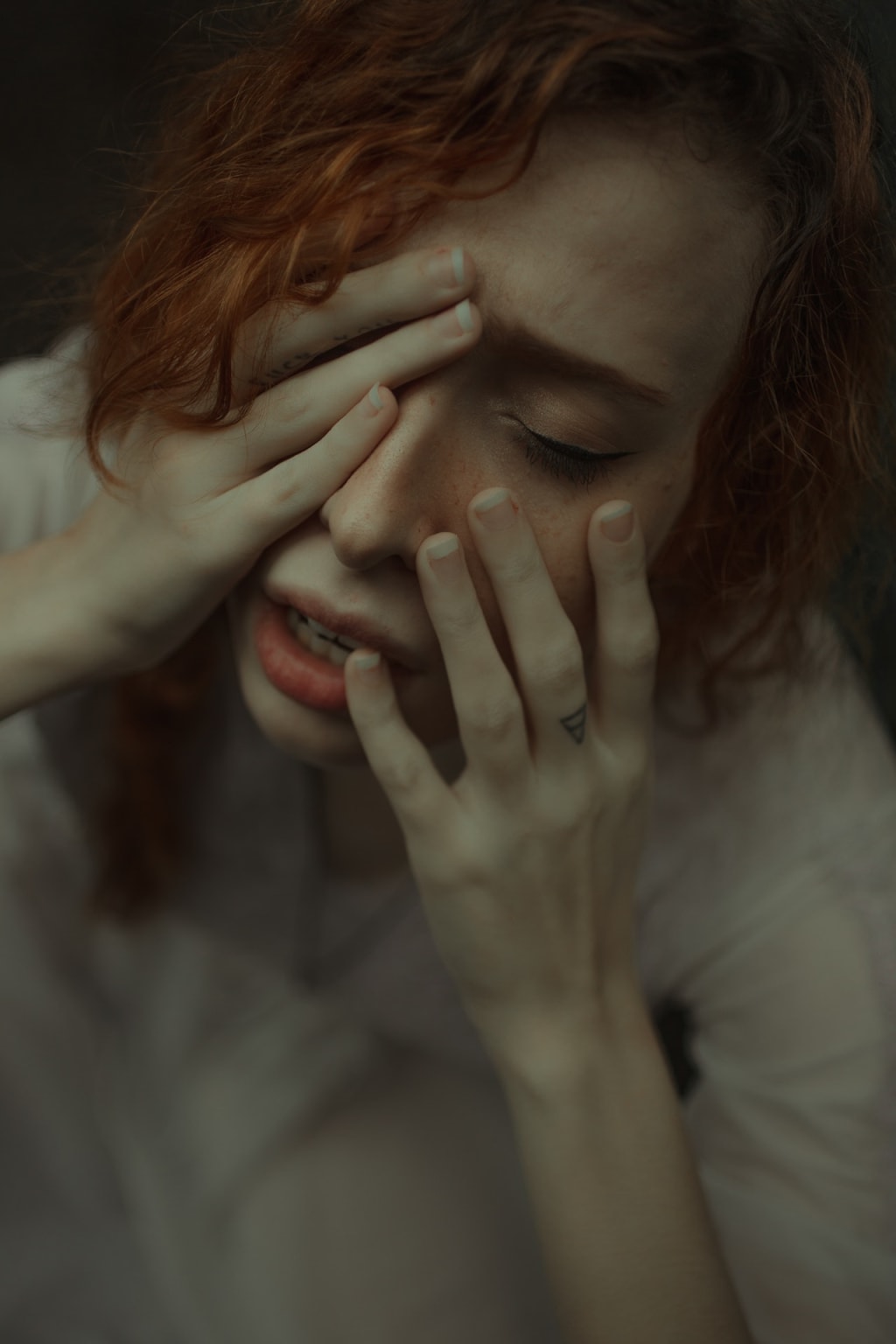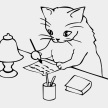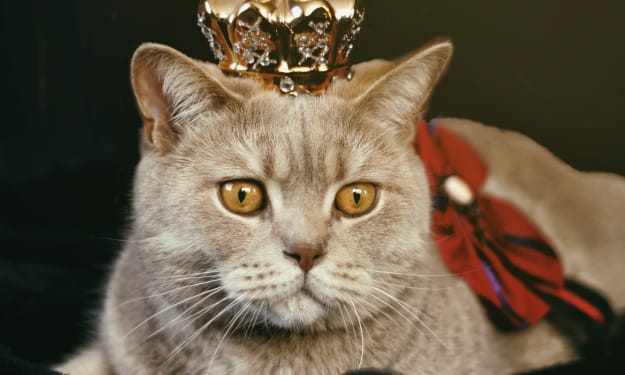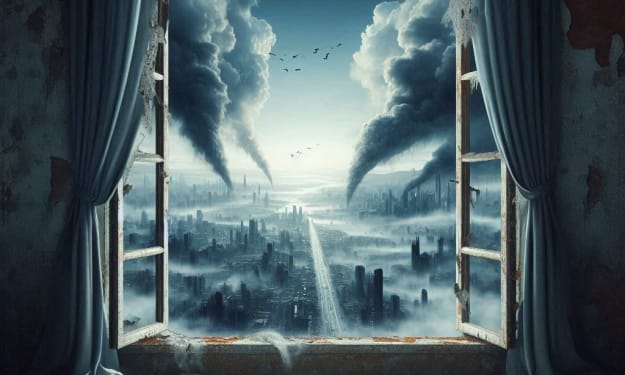Save Your Last Breath
An Account from a Dystopian Future

"Breathe. I need to breathe."
Listen, and use your imagination.
The oxygen levels were depleting fast. Pollution made way for every manner of sickness—but the government leaders never expected the very earth to turn against them. Plants and trees withered away to nothing, and the soil was parched in every corner of the globe. Even the rain forests, the last sanctuaries, became deserts over time.
"Help. Someone, help…"
Those are real recorded cries from a person suffering from lack of oxygen in the days leading up to earth’s final stand.
We thought we would escape the devastation on earth by ascending past the stratosphere and into the outer realms of space—but no one wants humans in their galaxy. We are the destroyers who pillage the very land that gives us life. It’s no wonder the earth rose up against us.
Let us delve into an account from someone who saw earth’s last days.
My name is Yanna. I was born in the year 2200. My mother taught me how to write when I was a little scrap of a thing. There were no books by then—the trees were becoming too scarce—but I learned because I was good at listening and even better at miming the ways my mother showed how the dyes could be used as ink on beaten, dried cloth. She died in the first wave of sickness during the Blood Scare. I had no one else, so I walked the twelve miles to get to my aunt’s village. There was barely any food for her own family, let alone an addition like me. But I was useful. I could traverse long distances to retrieve water, and I grew like a weed at first, though my arms and legs were sturdy and strong. I think that made all the difference as to why I survived and they didn’t.
Let me be honest with you. Yanna’s story, though remarkable, is a common refrain from those last few years of planet earth. She came from a poor village in a microcosmic country on a dilapidated continent. Though she never states exactly where she lived—she may not even have realized the location or the importance of such a thing—we do know that overpopulation contributed to much of the problems that plagued earth during this era. One might even say that population control should have been implemented to some degree, but the matter of free will and government intervention were topics that kept such discussions behind closed doors. In this unchecked manner, the earth easily grew to ten billion people, and resources grew scarce in many regions. Let’s turn to Yanna’s next entry to see how she fared in this type of world.
Auntie was the last one we buried. Her body was so thin that her bones stuck out like she was a malformed bird of prey. I didn’t like to see how she became a husk of the vibrant woman I knew before the drought hit us in the face. It was just me and Poppo, and I had to be strong for him. I took him by the hand, we took what belongings we had left, and we started walking. It could have been days or weeks, I don’t know, because I was so delirious from hunger and dehydration. At night, I slept but didn’t dream. I think I was too afraid to. Dreams were an escape, and I thought if I fell into a dream then I’d never want to wake up again. And I couldn’t do that to Poppo. He had already helped shovel dirt onto his mother. I didn’t want him to do the same for me. If anything, I wished we could have crawled into the same realm of dreams and never left. Maybe then we both could have been happy.
Because Yanna eventually transcribed her memories down into a database, we don’t know exactly what is truth and what is a fabrication or exaggeration. Under such straits of malnutrition paired with desert conditions, it’s entirely possible that she hallucinated portions of her journey from her abandoned village to the city where she came to reside for a seemingly significant portion of her life. The timeline for this is also unknown, as there are no records of Yanna’s existence from housing or employment. Among scholars who have pored over the contents of this diary, it’s believed that Yanna may have slipped through the cracks simply because she was not, as per the term of the era, “on the grid” as so many of her peers in wealthier countries were. Some even speculate she might have been trafficked at one time, but Yanna never alludes to such activity explicitly in her account. For purposes of discretion, we won’t be spending a great deal of time on Yanna’s adolescence, though the entries do mention a “Markus” who appears from time to time. One might think he was special to her at some point simply because she saw fit to include him in her story in the first place.
There are some things I cannot forgive. I cannot forgive the man who refused to help me feed Poppo when one night we slept in a doorway to keep out of the street. I cannot forgive the woman who spat at us for being “filthy” when we were just trying to survive. I cannot forgive the people who allowed such a world to come to exist. I cannot forgive anyone who would deny children the right to live just because they are not seen as citizens under the government overseer. I remember walking through deserted streets, trying to be as invisible as possible because I didn’t want to be attacked, or stolen from, or called ugly words that do not need repeating. All I wanted was to live and be happy. That’s all. Why would they deny me that? Just because I didn’t look like them? Just because I was a motherless, fatherless girl? For shame on them. They tell us there are more good people than bad in the world, but I don’t know if I believe it. I don’t think Poppo and I would have suffered as much if that were the case.
You there in the back! What do you have to say about this? Do you think she’s wrong in her account? Don’t be shy. We’re a space-faring people now, but Yanna relayed how she felt about the world as she knew it at the time. Do you think our current structure in space means we are better off? Are we kinder to our own now? What has changed? Is it because we almost lost everything once that we are now able to protect what we cherish most? I don’t want to get into politics here—not now, at least—but do you think we’ve done a good job? You all have your duties here on the ship. You get paid in credits, but you know you’ll never go hungry because it’s built in our system that no one will go without sustenance onboard. Have we reached a kind of utopia here? Why or why not? Think on that for a moment, class.
Poppo had grown up before my eyes like a tree might have, I think, in better eras. One moment he was just a sprout, but the next he was tall enough to overshadow me. It was only a matter of time before he went off on his own. I didn’t blame him. He had to find his own way in life. I just hoped he would take care and not tread into a war zone. It was so hard to tell where was peaceful and where was not, especially when you were living under the radar as much as possible like we were. I sometimes forgot how old I was because time ran differently for me while we lived in the city streets. Yet I made sure to practice my writing just so I wouldn’t forget that too, even though I often just traced the letters in the air or in the dirt because cloth was a luxury for only clothing. Before Poppo left that last time, though, he held out something in his hand. I took it and found it was a necklace with a pendant—a heart-shaped locket, I would later learn it was called—and I almost yelled at him right there. I thought he had stolen it. But, no, he assured me that he had found it in the market and had bartered away a few ration tickets to get it for me. A farewell gift, he said. And I don’t think I cried harder other than the days when I buried Mother and then Auntie.
Though we have much left to study about Yanna’s account and the way it describes pre-interstellar life back on earth, I think we can say that she teaches us about the real heart of humanity—and what made the species persist in the first place. We all easily could have had no future because of the way humanity drove earth into the ground, but there was enough self-awareness for large governments to secure a back-up plan if earth could not be reclaimed to its former glory. We are living that plan’s steps now at this very moment. How do you feel about that? I would like you to write an essay about how you might have fared with this kind of life on earth and what you might have done differently in these circumstances. And don’t scrimp on the details! I want at least three pages. Yes, three pages.
Now let’s get one last interlude from Yanna before we head out for break.
It was time to move on after Poppo decided to leave. Though I found myself looking longingly at the advertisements for space liners that were going to take off next summer, I knew with a sinking heart that, if this planet were dying like everyone said, then I too would perish with it. A poor girl like me wasn’t meant for space. But I did the next best thing: using money I had scrounged away from doing the odd errands around the city, I bought a ticket for a boat that would take me to the North American continent. I didn’t know the language well then, but I would learn. Even if it took every breath I had left in my body, I would see hope come through like sunlight through parting clouds. I wanted to believe in a better tomorrow. And I would have a life worth documenting. That’s what I promised myself on that long-ago day. And that’s why I’m writing this now. Maybe these words will outlive me. I hope they take flight someday.
About the Creator
Jillian Spiridon
just another writer with too many cats
twitter: @jillianspiridon
Enjoyed the story? Support the Creator.
Subscribe for free to receive all their stories in your feed. You could also pledge your support or give them a one-off tip, letting them know you appreciate their work.






Comments
There are no comments for this story
Be the first to respond and start the conversation.